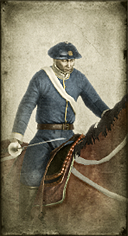
Basic Unit Statistics (can be modified by difficulty level, arts, skills, traits and retainers)
| Recruitment Cost | 1200 | |
| Upkeep Cost | 150 | |
| Melee Attack | 18 | 51% |
| Charge Bonus | 10 | 20% |
| Bonus vs Cavalry | 0 | 0% |
| Melee Defence | 7 | 20% |
| Armour | 2 | 13% |
| Morale | 10 | 20% |
Strengths & Weaknesses
- Very good in melee.
- Average charge.
- Weak against missile attacks and spear units.
- Good morale.
Abilities
- Wedge Formation - Trained to charge in a wedge formation in order to better penetrate enemy formations
Requires
Description
All dash and fire, les beaux sabreurs!
These splendid cavalrymen are best employed to flank the enemy line, and to charge into enemy infantry in the hope of disrupting their formations and driving them from the field. Their sabres are excellent melee weapons, but lack the reach to get to grips properly with spear-armed infantry or cavalry lancers. Sabre cavalry can be used to overrun artillery units, but they should not be needlessly exposed to artillery fire. Like many dashing horsemen, sabre cavalry have good morale, as they are convinced that they are a cut above ordinary soldiers! It seems a little odd that the Japanese, with a centuries-old tradition of exquisite swordsmithing, would abandon the deadly and beautiful katana in favour of a machine-produced foreign weapon like the sabre. However, thousands of sabres produced in German and English factories were exported across the world, and Japan received its fair share of blades; they were adopted as symbols of modernity. Sabres, however, were not particularly modern, or particularly European or American. The weapon has Turkish roots, and was copied by European powers. It is, however, superbly designed for slashing attacks from horseback, and this undoubtedly was the reason it was so widely adopted. In Europe, the sabre was regularly used to disperse troublesome mobs: the Russian Cossacks became notorious for their use of the sabre and even the British authorities had ordered cavalrymen to use their sabres against civilians on more than one occasion. On the battlefield, however, the days of the sabre were numbered: firepower was the main method of killing.